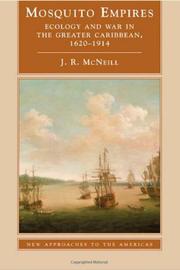| Listing 1 - 3 of 3 |
Sort by
|
Book
ISBN: 1613243359 9781613243350 9781608763986 1608763986 Year: 2010 Publisher: New York
Abstract | Keywords | Export | Availability | Bookmark
 Loading...
Loading...Choose an application
- Reference Manager
- EndNote
- RefWorks (Direct export to RefWorks)
Dengue. --- Breakbone fever --- Dengue fever --- Arbovirus infections --- Flaviviral diseases --- Hemorrhagic fever
Book
ISBN: 3642022146 3642260888 3642022154 9781282631021 1282631020 Year: 2010 Publisher: Berlin, Heidelberg : Springer Berlin Heidelberg : Imprint: Springer,
Abstract | Keywords | Export | Availability | Bookmark
 Loading...
Loading...Choose an application
- Reference Manager
- EndNote
- RefWorks (Direct export to RefWorks)
Scientific research on dengue has a long and rich history. The literature has been touched by famous names in medicine- Benjamin Rush, Walter Reed, and Albert Sabin, to name a very few- and has been fertile ground for medical historians . The advances made in those early investigations are all the more remarkable for the limited tools available at the time. The demonstration of a viral etiology for dengue fever, the recognition of mosquitoes as the vector for transmission to humans, and the existence of multiple viral variants (serotypes) with only partial cross-protection were all accomplished prior to the ability to culture and characterize the etiologic agent. Research on dengue in this period was typically driven by circumstances. Epidemics of dengue created public health crises, although these were relatively short-lived in any one location, as the population of susceptible individuals quickly shrank. Military considerations became as a major driving force for research. With the introduction of large numbers of non-immune individuals into endemic areas, dengue could cripple military readiness, taking more soldiers out of action than hostile fire. Dengue and dengue hemorrhagic fever, which assumed pandemic proportions during the latter half of the last century, have shown no indication of slowing their growth during this first decade of the twenty-first century. Challenges remain in understanding the basic mechanisms of viral replication and disease pathogenesis, in clinical management of patients, and in control of dengue viral transmission. Nevertheless, new tools and insights have led to major recent scientific advances. As the first candidate vaccines enter large-scale efficacy trials, there is reason to hope that we may soon "turn the corner" on this disease.
Dengue. --- Dengue viruses. --- Dengue --- Dengue viruses --- Dengue Virus --- Virology --- Flavivirus --- Microbiology --- Flavivirus Infections --- Arbovirus Infections --- Hemorrhagic Fevers, Viral --- Virus Diseases --- Biology --- Flaviviridae Infections --- Flaviviridae --- RNA Virus Infections --- RNA Viruses --- Biological Science Disciplines --- Diseases --- Viruses --- Natural Science Disciplines --- Vertebrate Viruses --- Disciplines and Occupations --- Organisms --- Communicable Diseases --- Microbiology & Immunology --- Infectious Diseases --- Medicine --- Public Health --- Health & Biological Sciences --- Breakbone fever --- Dengue fever --- Medicine. --- Immunology. --- Virology. --- Biomedicine. --- Immunobiology --- Life sciences --- Serology --- Clinical sciences --- Medical profession --- Human biology --- Medical sciences --- Pathology --- Physicians --- Arbovirus infections --- Flaviviral diseases --- Hemorrhagic fever --- Flaviviruses --- Medical virology. --- Medical microbiology --- Virus diseases

ISBN: 9780521452861 9780521459105 9780511811623 0511849974 0521459109 1283329417 9786613329417 0511674155 0511811624 0511672098 0511675348 0511670818 0511673361 1107205840 9780511675348 9780511673368 9780511672095 9780511669248 0511669240 9780511849978 9781283329415 0521452864 0511670028 9780511670022 9780511674150 9780511670817 661332941X 9781107205840 Year: 2010 Volume: *3 Publisher: Cambridge : Cambridge University Press,
Abstract | Keywords | Export | Availability | Bookmark
 Loading...
Loading...Choose an application
- Reference Manager
- EndNote
- RefWorks (Direct export to RefWorks)
This book explores the links among ecology, disease, and international politics in the context of the Greater Caribbean - the landscapes lying between Surinam and the Chesapeake - in the seventeenth through early twentieth centuries. Ecological changes made these landscapes especially suitable for the vector mosquitoes of yellow fever and malaria, and these diseases wrought systematic havoc among armies and would-be settlers. Because yellow fever confers immunity on survivors of the disease, and because malaria confers resistance, these diseases played partisan roles in the struggles for empire and revolution, attacking some populations more severely than others. In particular, yellow fever and malaria attacked newcomers to the region, which helped keep the Spanish Empire Spanish in the face of predatory rivals in the seventeenth and early eighteenth centuries. In the late eighteenth and through the nineteenth century, these diseases helped revolutions to succeed by decimating forces sent out from Europe to prevent them.
History of Latin America --- anno 1600-1699 --- anno 1700-1799 --- anno 1800-1999 --- Caribbean Area --- Caribbean area --- Human ecology --- Nature --- Revolutions --- Yellow fever --- Malaria --- Epidemics --- Medical geography --- History. --- Effect of human beings on --- Environmental aspects --- Diseases --- Geographical distribution of diseases --- Geographical pathology --- Geography, Medical --- Geomedicine --- Medical topography --- Pathology, Geographic --- Topography, Medical --- Geography --- Medical climatology --- World health --- Disease outbreaks --- Outbreaks of disease --- Pestilences --- Communicable diseases --- Ague --- Chills and fever --- Intermittent fever --- Malarial fever --- Fever --- Protozoan diseases --- Arbovirus infections --- Flaviviral diseases --- Insurrections --- Rebellions --- Revolts --- Revolutionary wars --- History --- Political science --- Political violence --- War --- Government, Resistance to --- Ecology --- Environment, Human --- Human beings --- Human environment --- Ecological engineering --- Human geography --- Geographical distribution --- Outbreaks --- Social aspects --- Effect of environment on --- Pandemics --- Mosquitoes --- Social change --- pathogenicity. --- Change, Social --- Cultural change --- Cultural transformation --- Societal change --- Socio-cultural change --- Social history --- Social evolution --- Culicidae --- Mosquitos --- Diptera --- Arts and Humanities
| Listing 1 - 3 of 3 |
Sort by
|

 Search
Search Feedback
Feedback About
About Help
Help News
News